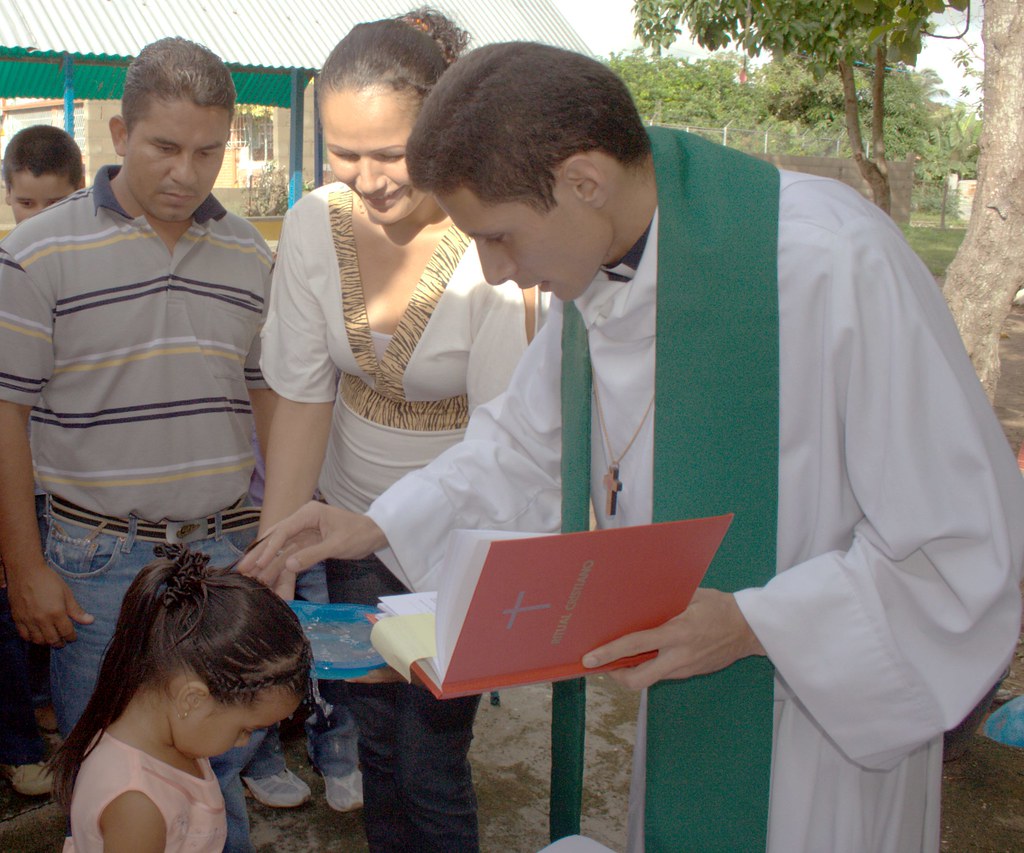
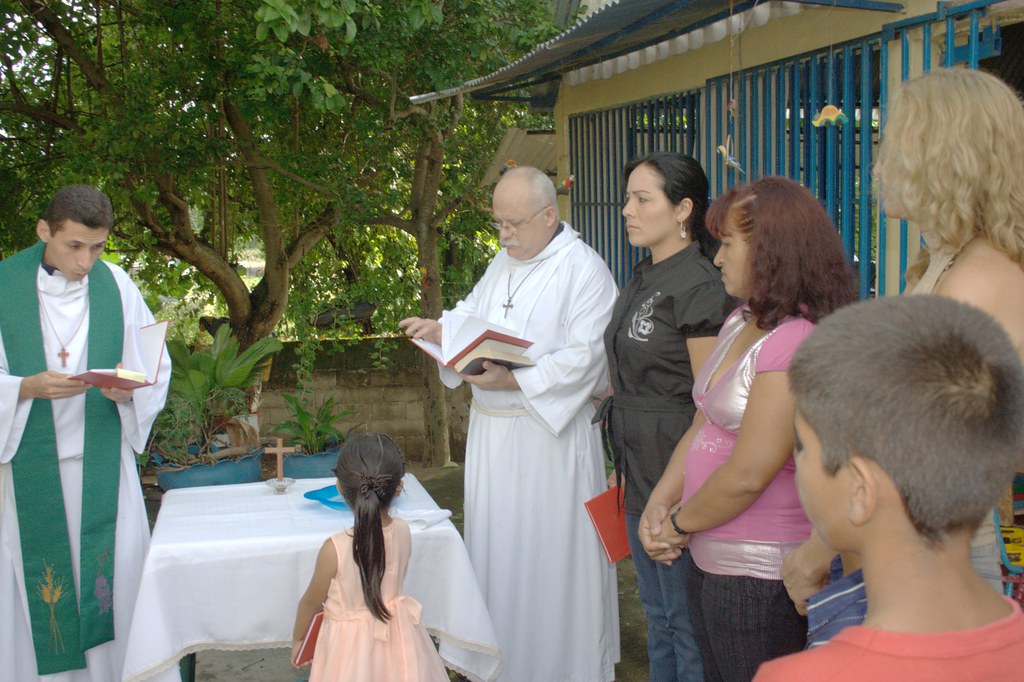
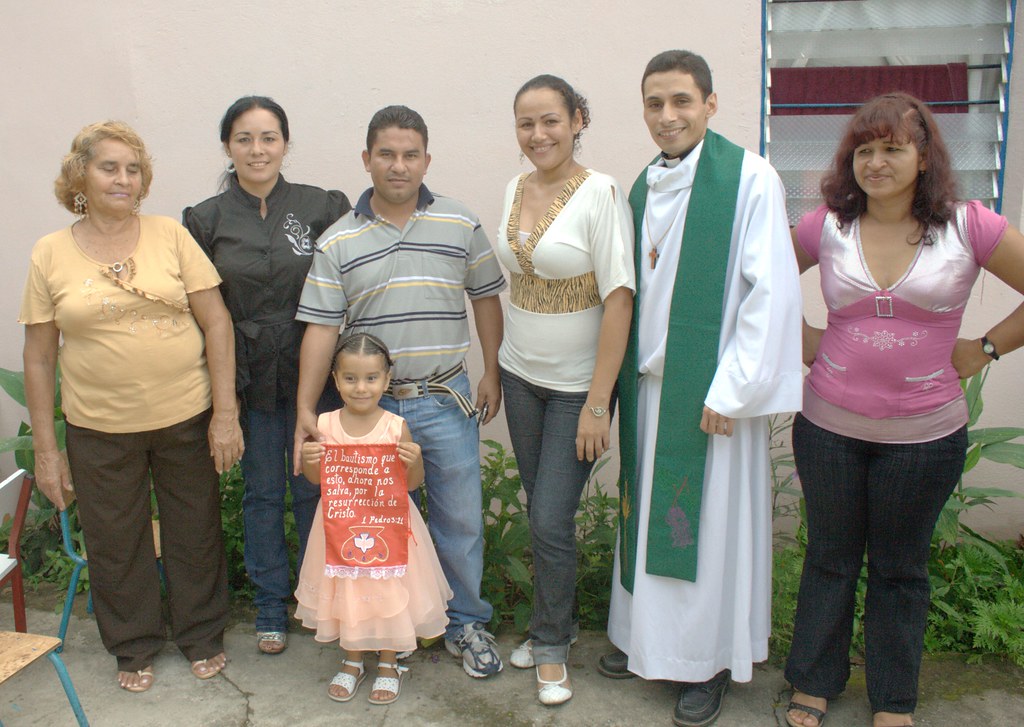 Genesis Noeli Marquina Villamizar was baptized June 29, 2008, in La Caramuca. I assisted Pastor Miguelángel Pérez in this, the 10th baptism here since we started our mission project in 2004.
Genesis Noeli Marquina Villamizar was baptized June 29, 2008, in La Caramuca. I assisted Pastor Miguelángel Pérez in this, the 10th baptism here since we started our mission project in 2004.Genesis, who is one of the children enrolled in our preschool, was born in 2004. It is sobering to realize that many of the preschool children were not yet born when I first visited Venezuela in 2002. Of course, this includes Luz María's three youngest grandchildren. Her fourth-oldest grandchild, Oriana, was an infant when I met Luz María. Now Oriana is nearly six years old.
Sponsors at the baptism included two relatives, Angelmiro Camacho and Ana Julia de Toro Peña, Yepci, Luz María's oldest daughter, and Eduardo, my partner-vicar. There were more than 30 people, children and adults, present for the baptism that Sunday afternoon. Eduardo was not actually present, since he took Miguelángel's place, preaching in Barquisimeto. But Genesis loves Eduardo, so we made sure his name was on the baptismal certificate.
Noel and Jefferson, the two older brothers of Genesis, have been faithfully attending our Sunday school. The boys received the sacrament of holy baptism as infants from a Roman Catholic priest, but Genesis never did, due to the influence of a relative who converted to Pentecostalism.
For hundreds of years, Venezuelans regarded baptism in a Roman Catholic church essentially as an insurance policy in case the Christian God turned out to have the last word after all. They were not helped in their understanding by Roman Catholic teaching which emphasizes the ritual of baptism as being efficacious in and of itself, apart from the Holy Spirit working within the heart and daily life of the believer.
Nevertheless, as Lutherans, we agree with Roman Catholics that God has instituted the sacrament of baptism as the visible means by which the believer receives the promise of eternal life in Christ and thus the regeneration of the Holy Spirit.
However, over the last 30 to 40 years, the influence of the Roman Catholic Church has waned in Latin America. This may be largely the result of a worldwide shortage of priests as well as a general dissatisfaction with established institutions due to the persistent wide gap between the rich and the poor in this part of the world. During this same period, most traditional Protestant churches have greatly reduced missionary efforts in Latin America, leaving the field open to Pentecostal/charismatic groups which teach that all may have direct access to the Holy Spirit apart from the authority of the inspired Scriptures and the sacraments instituted by Christ Himself.
Luther recognized the corrosive effect of this idea on any objective standard of faith when he said of the Zwickau Prophets, “They have swallowed the Holy Spirit, feathers and all.” Indeed, one of the most active groups in Venezuela today is the United Pentecostal Church, a “charismatic” body that denies the fundamental doctrine of the Trinity. Under the Pentecostal umbrella there are many other lesser-known heresies, generated by leaders who claim “apostolic” authority apart from either an ecclesiastical hierarchy or the Holy Scriptures.
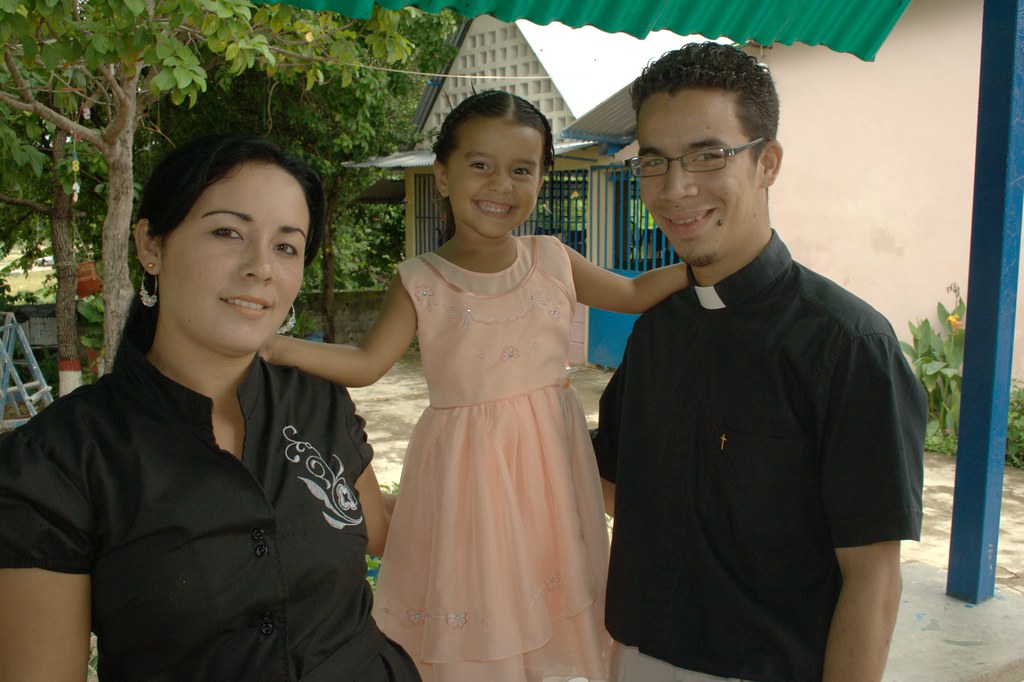 And certainly Pentecostal theology fits in well with the syncretistic stew that is popular religion in Venezuela. The idea of daily supernatural revelations and interventions is very consistent with the practice of brujeria and espiritismo, as is the “health and prosperity” gospel which claims that if you pray hard enough, God will bless you with all of your earthly desires. In fact, this aspect of Pentecostalism may be the most popular of all here.
And certainly Pentecostal theology fits in well with the syncretistic stew that is popular religion in Venezuela. The idea of daily supernatural revelations and interventions is very consistent with the practice of brujeria and espiritismo, as is the “health and prosperity” gospel which claims that if you pray hard enough, God will bless you with all of your earthly desires. In fact, this aspect of Pentecostalism may be the most popular of all here.Finally, there is the notion that if you may receive a “baptism of the Spirit” apart from the visible means of grace, “water baptism” is not necessary at all, despite our Lord's command. We praise God that after hearing Luz María explain the blessing of holy baptisms to the mothers of our preschool children, Zoraida, Genesis' mother, decided she wanted this gift for her daughter. Eduardo and I, and finally Miguelángel, had further meetings with the family to explain what we believe about baptism, and the responsibilities of parents and sponsors.
Miguelángel also preached and administered the sacrament of the Lord's Supper that Sunday morning at Corpus Christi Lutheran Church in Barinas. I do not recall now under what circumstances I first meet Miguelángel. It seems he always has been in the picture. He is about the same age as Luz María's older daughters and is an old friend of theirs from national Lutheran youth gatherings. When Luz María and I were living on Tierra de Gracia Lutheran Farm in eastern Venezuela, Miguelángel came to visit us there.
He had been studying for the ministry for nearly the whole time I have known him. He
was finally ordained March 30, 2008, and now serves as the pastor of two congregations, Cristo es Amor (Christ is Love) and El Paraiso (Paradise), in Barquisimeto. He originally was a member of Cristo es Amor.
The week before the baptism I attended a seminar in pastoral care in Caracas. Pastor Henry Witte led the seminar. He and his wife, Ruthie, served as missionaries in Venezuela for 20 years and for five years in Panama. They are back in the United States where Henry has accepted a call to Sioux City, Iowa.
The focus of the seminar was following the theology of the cross rather than the theology of glory in counseling the severely ill, the dying and the families of such people. The "health-and-prosperity gospel” is, of course, a form of the theology of glory, which says having a right relationship with God means gaining everything you want in this life. The theology of the cross, on the other hand, says suffering is part of living in a world marred by sin and that the
point of the Christian life is not to avoid suffering, but to withstand the temptation to despair through the hope of life eternal.
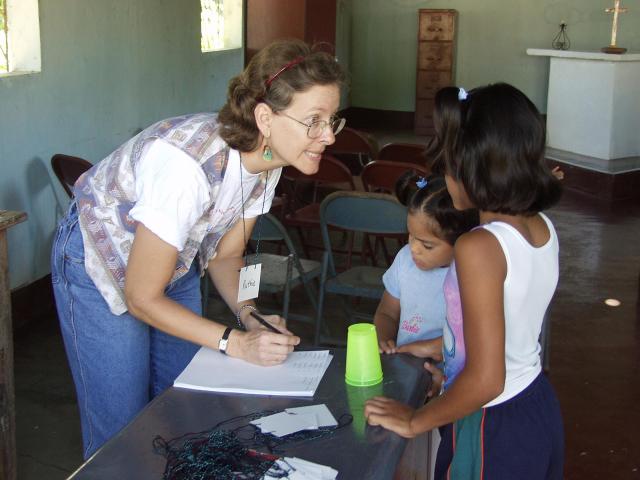 I met the Wittes on my first visit to Venezuela six years ago. Ruthie led the children in vacation Bible school in Quebrada Seca, Monagas, in the “Padre Nuestro” song which we now are using to teach our preschool children the Lord's Prayer. This past week I recorded Eduardo and his brother, Francisco Rafael, singing “Padre Nuestro” and other songs for children to guitar accompaniment. Then I burned a CD to play in the preschool even on the days when Eduardo is not able to come to La Caramuca.
I met the Wittes on my first visit to Venezuela six years ago. Ruthie led the children in vacation Bible school in Quebrada Seca, Monagas, in the “Padre Nuestro” song which we now are using to teach our preschool children the Lord's Prayer. This past week I recorded Eduardo and his brother, Francisco Rafael, singing “Padre Nuestro” and other songs for children to guitar accompaniment. Then I burned a CD to play in the preschool even on the days when Eduardo is not able to come to La Caramuca.Listen to "Padre Nuestro".
We would ask you to remember in prayer the family of former missionary Rudy Blank and his wife, Ramona. Her father, Adrian Rivero, passed away this week. Adrian was one of the first national pastors in the Lutheran Church of Venezuela and remained a member of Principe de Paz (Prince of Peace) Lutheran Church in Sierra Caroni until his death.
No comments:
Post a Comment